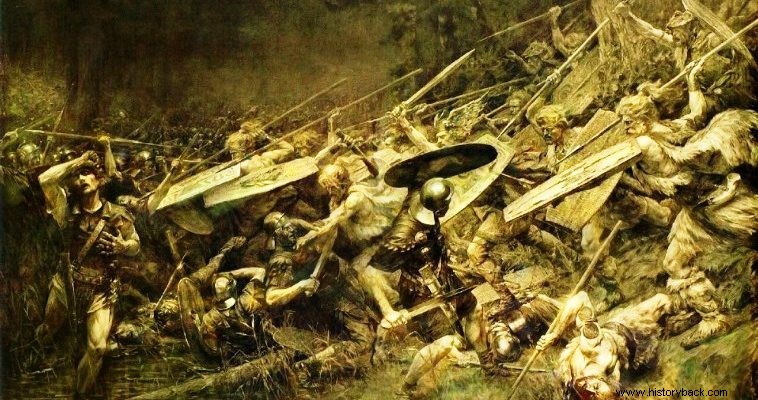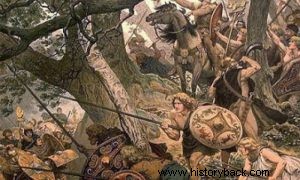
At the beginning of the 1st c. A.D. the Romans had invaded the lands of present-day Germany. In 6 AD the Romans defeated various Germanic tribes and established a bridgehead east of the Rhine. Rome entrusted the administration of the region to the patrician Poplius Quintilius Varus.
Emperor Tiberius, however, was forced to stop the campaign in Germany due to the Illyrian revolution that broke out at that time. Large forces drawn from other fronts were gathered to suppress the rebellion. In Germany Varus was left with only three legions, the XVII, XVIII and XIX. Varos was particularly known for his cruelty and for his preference to cross opponents.
The Arminius
The German prince Arminius (Hermann) he was the son of the king of the Cheruscan tribe, Sigimerius, and was sent by his father as a hostage to Rome as a child. He received military training there. When he returned from Rome to Germany, Arminius assumed the duties of Varus' adviser.
Arminius feigned faith in Rome , but in reality he was working to create an alliance of the German tribes against the common enemy. The withdrawal of significant Roman forces due to the Illyrians was a prime opportunity for Arminius.
Road to Destruction
As the summer of 9 AD was drawing to a close Varus decided to move his army from the area west of the Weser River to the Rhine to spend the winter. But Arminius had organized a rebellion in the region to force the Roman general to change course.
Arminius undertook to lead the Romans into a relatively unknown area through the Teutoburg Forest, where the Roman army could easily be trapped. The plan of Arminius was betrayed to the Romans by the father-in-law of the Germanic leader. Arminius then left the Roman camp.
Despite Arminius leaving with an excuse, Varus, ignoring the warnings, entered the difficult wooded area with three legions, six cohorts of auxiliaries, three cavalry companies and a large number of civilian followers. The historian Dion Cassius reports that Varos did not even send reconnaissance patrols ahead.
Massacre
The Romans marched in a phalanx of march at least 15 km long. Thus spread out, they received the first attack by the Germans of Arminius on either side of the road where they were moving. Arminius, knowledgeable about Roman tactics, masterfully directed his men.
The Romans fought with the courage of despair and managed to withstand the attack despite their heavy losses. In the evening they even built a makeshift fortified camp. The next morning they continued their march towards the Viechen Hills. A torrential rain was falling and the Romans had largely lost their cohesion. A section was even detached and moved independently.
While marching, they received a new German attack. Those who escaped her moved towards the Calcriese hill where Arminius had set up the last ambush even building a wall along the road, while they had also dug trenches. The Romans attacked to take the wall and open the road but failed.
Then the Roman cavalry he fled, abandoning the infantry, but was ambushed by the German cavalry and all his men were mercilessly slaughtered. With the Romans unable to move, the Germans counterattacked and wiped them out. The carnage was incredible . Varos committed suicide. The Roman army was annihilated in its entirety. The Germans kept only a few prisoners alive, but they sacrificed them to their gods later.
After his great victory, Arminius conquered all the Roman forts east of the Rhine. In Rome hearing of the defeat caused despair. Tiberius was forced to send reinforcements to hold the Rhine line. Arminius emerged as the supreme leader of the Germans. But he was assassinated by rivals in power in 21 AD.

